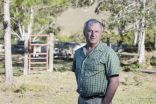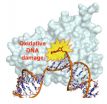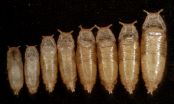Pathology specialist contributes to debate on breast cancer gene screening
Invited commentary by Dr. Glenn Palomaki published in Genetics in Medicine
2014-11-25
(Press-News.org) There has been much recent debate on the benefits and risks of screening for breast cancer using BRCA1 and BRCA2 mutations in the general adult population. With an estimated 235,000 new breast cancer diagnoses each year in the U.S. and more than 40,000 deaths, it is clearly important to be able to determine which women may be genetically predisposed to breast cancer.
Glenn E. Palomaki, PhD, associate director of the Division of Medical Screening and Special Testing in the Department of Pathology and Laboratory Medicine at Women & Infants Hospital of Rhode Island has recently published an invited commentary in the November issue of Genetics in Medicine. The commentary is entitled "Is it time for BRCA1/2 mutation screening in the general adult population? Impact of population characteristics."
A family history of breast or ovarian cancer or a personal history of early-onset cancer are strong risk factors for breast cancer. Systematic criteria when caring for a patient with a positive family history have been well established by such agencies as the U.S. Preventive Services Task Force and the National Comprehensive Cancer Network.
Dr. Palomaki said, "With the identification of the tumor suppressor genes BRCA1 and BRCA2 in the 1990s, the scientific community has extensively explored both the personal and population impact of carrying a deleterious mutation in these genes. Any new population-based screening test, such as testing for BRCA1 and BRCA2 mutations, requires consideration of key performance characteristics that evaluate both strengths and shortcomings before its introduction."
In his commentary, Dr. Palomaki cited two recent publications that present perspectives on routine, population-based screening for breast cancer using BRCA1/2 mutations in different populations.
"Together, these two publications offer an unusual opportunity to compare and contrast how distinct population differences, such as the mutations carrier rate, might influence the feasibility of population-based screening," said Dr. Palomaki. "Because founder mutations are more common in Ashkenazi Jewish women, are more easily identified and account for a higher proportion of all breast cancer cases, pilot trials in that population are indicated before launching widespread screening in Israel to identify and resolve implementation issues. Such screening in the United States, however, is more complicated, tilting the balance away from routine population screening, as least for the moment."
INFORMATION:
Genetics in Medicine is the official journal of the American College of Medical Genetics and Genomics with a mission to enhance the knowledge and practice of medical genetics and genomics. This peer-reviewed monthly journal offers an unprecedented forum for the presentation of innovative, clinically relevant papers in contemporary genetic medicine, including such areas as genomics, chromosome abnormalities, metabolic diseases, single gene disorders and health services/implementation research. GIM is a highly visible venue for the dissemination of advances in public health genetics, screening, applications of next generation sequencing technology, informatics and database development and management. It is an ideal forum for manuscripts relating to important genetic counseling issues, ethical, legal and social implications of genetics, and all levels of education in human medical genetics.
About Women & Infants Hospital
Women & Infants Hospital of Rhode Island, a Care New England hospital, is one of the nation's leading specialty hospitals for women and newborns. A major teaching affiliate of The Warren Alpert Medical School of Brown University for obstetrics, gynecology and newborn pediatrics, as well as a number of specialized programs in women's medicine, Women & Infants is the eleventh largest stand-alone obstetrical service in the country with nearly 8,400 deliveries per year. A U.S.News 2014-15 Best Children's Hospital in Neonatology, in 2009, Women & Infants opened the country's largest, single-family room neonatal intensive care unit.
New England's premier hospital for women and newborns, Women & Infants and Brown offer fellowship programs in gynecologic oncology, maternal-fetal medicine, urogynecology and reconstructive pelvic surgery, neonatal-perinatal medicine, pediatric and perinatal pathology, gynecologic pathology and cytopathology, and reproductive endocrinology and infertility. It is home to the nation's only mother-baby perinatal psychiatric partial hospital, as well as the nation's only fellowship program in obstetric medicine.
Women & Infants has been designated as a Breast Center of Excellence from the American College of Radiography; a Center of Excellence in Minimally Invasive Gynecology; a Center for In Vitro Maturation Excellence by SAGE In Vitro Fertilization; a Center of Biomedical Research Excellence by the National Institutes of Health; and a Neonatal Resource Services Center of Excellence. It is one of the largest and most prestigious research facilities in high risk and normal obstetrics, gynecology and newborn pediatrics in the nation, and is a member of the National Cancer Institute's Gynecologic Oncology Group and the National Institutes of Health's Pelvic Floor Disorders Network. END
ELSE PRESS RELEASES FROM THIS DATE:
2014-11-25
This news release is available in German.
Wireless data transmission largely takes place via WLAN networks, such as WiFi. However, these networks are currently limited to high frequency ranges at 2 GHz and above and, hence, have a limited range. The authors of the study, Arnd Weber of the Institute for Technology Assessment and Systems Analysis (ITAS) of KIT and Jens Elsner, a former member of the staff of the KIT Communications Engineering Lab, propose to extend the frequencies for free communication to include lower ranges and even increased transmission power. ...
2014-11-25
A higher surge of testosterone in competition, the so-called "winner effect," is not actually related to winning, suggests a new study of intercollegiate cross country runners.
The International Journal of Exercise Science published the research, led by David Edwards, a professor of psychology at Emory University, and his graduate student Kathleen Casto.
"Many people in the scientific literature and in popular culture link testosterone increases to winning," Casto says. "In this study, however, we found an increase in testosterone during a race regardless of the athletes' ...
2014-11-25
Anglers across the nation wondering why luck at their favorite fishing spot seems to have dried up may have a surprising culprit: a mine miles away, even in a different state.
Scientists at Michigan State University (MSU) have taken a first broad look at the impacts of mines across the country- and found that mining can damage fish habitats miles downstream, and even in streams not directly connected to the mines.
The work is published in this week's issue of the journal Ecological Indicators.
"We've been surprised that even a single mine in headwaters might influence ...
2014-11-25
Australian average incomes are falling with the country's population growth "masking underlying economic weakness", according to a QUT economist.
Dr Mark McGovern, a senior lecturer in QUT's Business School, said while it was regularly proclaimed Australia had experienced positive economic growth for more than 20 years, there had been periodic per capita declines, indicating the economy was not as healthy as assumed.
"Looking at national income figures in recent years shows our economy is under stress," Dr McGovern, whose research was recently published in the Economic ...
2014-11-25
Few agribusinesses or governments regulate the types of plants that farmers use in their pastures to feed their livestock, according to an international team of researchers that includes one plant scientist from Virginia Tech.
The problem is most of these so-called pasture plants are invasive weeds.
In a Proceedings of the National Academy of Sciences study this month, the scientists recommended tighter regulations, including a fee for damage to surrounding areas, evaluation of weed risk to the environment, a list of prohibited species based on this risk, and closer ...
2014-11-25
Using a new imaging technique, National Institutes of Health researchers have found that the biological machinery that builds DNA can insert molecules into the DNA strand that are damaged as a result of environmental exposures. These damaged molecules trigger cell death that produces some human diseases, according to the researchers. The work, appearing online Nov. 17 in the journal Nature, provides a possible explanation for how one type of DNA damage may lead to cancer, diabetes, hypertension, cardiovascular and lung disease, and Alzheimer's disease.
Time-lapse crystallography ...
2014-11-25
PHILADELPHIA (Nov. 25, 2014) - As the linked epidemics of obesity and diabetes continue to escalate, a staggering one in five U.S. adults is projected to have diabetes by 2050.
Ground zero for identifying ways to slow and stop that rise is Philadelphia, which has the highest diabetes rate among the nation's largest cities. For public health researchers at Drexel University, it is also a prime location to learn how neighborhood and community-level factors -- not just individual factors like diet, exercise and education-- influence people's risk.
A new Drexel study published ...
2014-11-25
PITTSBURGH, Nov. 24, 2014 -Barriers to the sharing of public health data hamper decision-making efforts on local, national and global levels, and stymie attempts to contain emerging global health threats, an international team led by the University of Pittsburgh Graduate School of Public Health announced today.
The analysis, published in the journal BMC Public Health and funded by the Bill & Melinda Gates Foundation and the National Institutes of Health (NIH), classifies and examines the barriers in order to open a focused international dialogue on solutions.
"Data on ...
2014-11-25
The proper regulation of body size is of fundamental importance, but the mechanisms that stop growth are still unclear. In a study now published in the scientific journal eLife*, a research group from Instituto Gulbenkian de Ciência (IGC), led by Christen Mirth, shed new light on how animals regulate body size. The researchers uncovered important clues about the molecular mechanisms triggered by environmental conditions that ultimately affect final body size. They show that the timing of synthesis of a steroid hormone called ecdysone is sensitive to nutrition in the ...
2014-11-25
People's views on income inequality and wealth distribution may have little to do with how much money they have in the bank and a lot to do with how wealthy they feel in comparison to their friends and neighbors, according to new findings published in Psychological Science, a journal of the Association for Psychological Science.
"Our research shows that subjective feelings of wealth or poverty motivate people's attitudes toward redistribution, quite independently of objective self-interest," says psychological scientist and study co-author Keith Payne of the University ...
LAST 30 PRESS RELEASES:
[Press-News.org] Pathology specialist contributes to debate on breast cancer gene screening
Invited commentary by Dr. Glenn Palomaki published in Genetics in Medicine





